NBC's John Wood on Ryder Cup Caddying, Superstitions and Why the U.S. Hasn't Won on the Road in 30 Years

If the Masters is golf’s presentation to the masses, the Ryder Cup is for serious fans only. Any sporting event contested biennially must come to terms with its niche status, which in this case has led to exponential growth—the match-play series between the United States and Europe was barely on the map 40 years ago. The late Tom Weiskopf skipped the 1977 gathering to hunt sheep in the Canadian Rockies, a decision he announced to minimal opposition six months earlier.
The entire U.S. squad was condemned for counting sheep at back-to-back Ryder Cups in the mid-2000s, a pair of nine-point losses that proved just how far this affair had come, but it’s still small potatoes on the mainstream sports buffet. A highly intense team clash with nationalistic overtones probably deserves better dates than in late September, at which point the NFL and college football have fully revved their engines and Major League Baseball has finally started to matter.
Tradition does not negotiate, however, nor does golf budge. If you’re not watching, you don’t know what you’re missing. And if you do watch, you’ve already wolfed down all that Ryder Cup buildup, a requisite to anyone’s reservoir of knowledge regarding those three precious days every other autumn. With that in mind, we’ve enlisted the services of an authentic expert: NBC ground analyst John Wood, who spent 24 years caddying for several high-profile players on the PGA Tour.

Since working for Mark Calcavecchia at the 2002 matches in England, Wood has been a Ryder Cup fixture. From carrying a bag over his shoulder to a microphone in his hand, his acute observational skills and remarkable recall make him an ideal source for behind-the-scenes material no pregame show will give you. Although his viewpoints can’t be classified as purely impartial, Wood is as close to unbiased as unbiased gets. Passion breeds perspective. Perspective breeds credibility.
Sports Illustrated: Why hasn’t America won an overseas Ryder Cup in 30 years?
John Wood: There are a few factors, and maybe some Ryder Cups have different reasons for the European home dominance, but first and foremost to me is putting. This may be a controversial opinion, but in the Ryder Cups I’ve been a part of, I believe the Europeans historically have outworked the Americans on the greens during the practice rounds, and they have a routine down between the players and caddies. I watch them working hole locations together, as a group, talking them over with their potential partners. Those practice rounds may seem glacially slow, but it seems to pay off once the balls are in the air. They read putts together in a more natural style. There is a rhythm and consistency to it, and they’re able to come up with a consensus, even with the extra set of eyes. American pairings may do the same, but they don’t end up with a consensus. I don’t think they’re as clear of mind sometimes.
SI: Each of the last four Ryder Cups has produced a winning margin of at least five points, including Uncle Sam’s 10-point romp at Whistling Straits two years ago. What on earth has happened to our beguiling little nail-biter?
JW: The agreement is that the home-team captain sets up the course, and that’s probably the biggest reason we’ve seen so many recent blowouts. Ryder Cups played in the U.S. tend to have very little rough, wide fairways and fast greens. In Europe, it’s basically the opposite. Maybe it’s time to sit down and come up with a standard. Not one and a half inches of rough or five, but somewhere in between. How about fairways 30 yards wide instead of 20 or 40? I’ve been a proponent of this for years. Get an arbitrator involved. There’s plenty of room for a happy medium.
SI: Did U.S. captain Zach Johnson make a wise choice in adding Justin Thomas to his roster?
JW: There are a lot of reasons why a player doesn’t perform well at a Ryder Cup, especially one overseas. One of the biggest reasons is nerves and, frankly, fear. In taking JT, you remove that concern. He has an inner confidence, a step-on-your-neck attitude, and that’s pretty rare. He’s also a natural pairing for Jordan Spieth or Rickie Fowler [at the 2017 Presidents Cup], so the pick makes a lot of sense. Michael Jordan used to say he preferred to hear silence in a visiting arena to a deafening roar at home. I think JT is the same kind of player.
SI: Speaking of nerves and fear, any good tales of preoccupation with the pressure?
JW: In ‘02, we sat out the opening session but I wanted to be out on the first tee to support my teammates and take in the atmosphere. Our first pairing was Paul Azinger and Tiger Woods. By this point, Paul had earned a reputation as America’s bulldog—he’d played well in Ryder Cups and had the confidence to handle any situation. It was a short, fairly easy par-4. Zinger was first to play, and I was standing close enough to see his hand shaking as he teed up his ball. He flared one into the right rough, came back to his bag and told his caddie, "I just wanted to get it airborne."
The other story I’ll tell is in 2012 at Medinah. Phil Mickelson was playing with Keegan Bradley in an alternate-shot match and the crowd was going crazy, which is always the case on the first tee at a Ryder Cup. Keegan teed up his ball, went through his pre-shot routine and spit-roasted one 350 yards down the center of the fairway. Seemingly no nerves at all, right? They walk off the tee and Keegan asks Bones [former Mickelson caddie Jim Mackay] what had just happened. He didn’t know where his ball ended up, how far it went—he had blacked out like Will Ferrell in the debate scene in Old School. Only at a Ryder Cup.
SI: How crucial is team chemistry to the winning formula?
JW: I think there’s something to it, but perhaps it is overrated. I know it’s a more pleasant week when everyone gets along, but sometimes a little edge can be a good thing. With the advent of the pod system and use of analytics, I think it’s important to find three groups of four with great chemistry. I don’t think it’s important to have 12 guys who want to have Christmas dinner together every year. Within the smaller groups, however, it’s extremely important.
SI: Of all the captains you’ve been around, is there one who stands out as an independent thinker?
JW: Yes, and it’s not because I work with him now. Azinger was completely different than the others. He was the first guy who had a plan and stuck with it come hell or high water. You never got the sense that if the matches didn’t start well, he was going to start throwing darts at a board to change the mojo. It was the first time I’d been in a room where we knew exactly what we’d be doing Tuesday, Wednesday, and Thursday. It made preparation for players and caddies so much easier when the matches began Friday.
SI: Are caddies included in the process of determining pairings?
JW: Yes, and the best captains do that. Nobody knows a player better than his caddie, and caddies are notoriously truth tellers. A captain might give you a couple of options and ask which one you think will put your player in the best position to succeed. I can’t say I’ve had a captain who let a caddie flat-out decide a pairing, but he’d be crazy to ignore that information. Azinger was great at that. Fred Couples at the Presidents Cups, Tiger in Melbourne. One of the funniest exchanges I’ve ever had with a captain was at the 2013 Presidents Cup. My guy, Hunter Mahan, was playing really well. Fred came out during the morning matches and asked how he was doing and I said, "Fred, send him out with anyone this afternoon and he’ll get you a point. He’s playing great and has a ton of energy."
So we finished the morning matches and I saw that Hunter was sitting out the afternoon. I gave Fred the universal sign for "what happened?" He walked over to me as only Fred can and put his arm around me. "Woody, I got in there and choked!" he says. "I’m so sorry." We had a great laugh about that.
SI: Are you a practitioner of superstition? If so, you certainly weren’t the only one in the team room ...

JW: I haven’t heard of a lot of them, but there’s an interesting story between [Spieth’s caddie] Michael Greller and myself at Hazeltine in 2016. Earlier that year, a bunch of us rented out Hoosier Gym in Indiana for a night of basketball. It’s the actual gym where they filmed Michael’s favorite movie of all time, Hoosiers. I mean, Michael really sold out that night. He wore the Jimmy Chitwood jersey, found some short shorts at a thrift store—and won just about every game of knockout we played. "Jimmy don’t lose in his own gym," he kept saying. So as the Ryder Cup approached, I told Michael, "You need to bring that jersey and hang it in our locker room for luck. We’ll all touch it on the way out to play and it’ll be our talisman for the week." He did, we won, and we talk about it to this day.
SI: Is there a secret intangible to Ryder Cup success that we’ve been overlooking all along?
JW: I don’t think there’s any one component that decides these things. The one aspect I do consider absolutely huge is that you get on the board early. Earning a point Friday puts you at ease for the rest of the week. You play with much more freedom. If you go out on Friday and lose both matches, the pressure really builds and builds with each session. It can be a nightmare, but when you get on the board early, you think, "O.K., I’ve contributed. Now let’s go do it again."
SI: If you were put in charge of the PGA of America and could make one change to the way the Ryder Cup operates now, what would it be?
JW: This is out of pure selfishness, but as each player gets one day with the actual Ryder Cup during the two-year period following a victory, I’d make sure each caddie gets a day with it, too. I mean, you’ve got it for what, 730 days? And out of those 730 you’ve got 12 days with the players, plus another handful of promotional events, and believe me—winning a Ryder Cup means as much to the caddies as it does to anyone. When we’ve lost in the past, I’ve been depressed for weeks thinking what I could have done differently. And when we’ve won, it felt like the biggest thing you’ll ever experience in your career. It would just be an extremely special gesture of appreciation.
